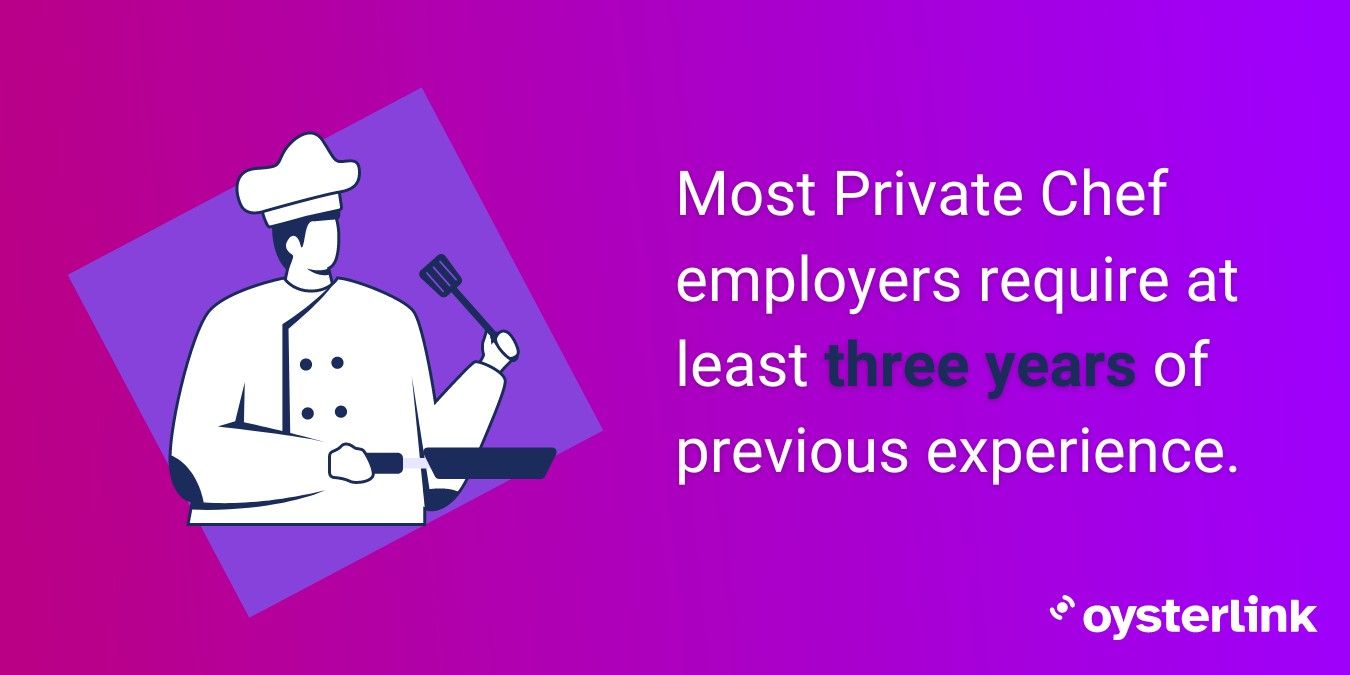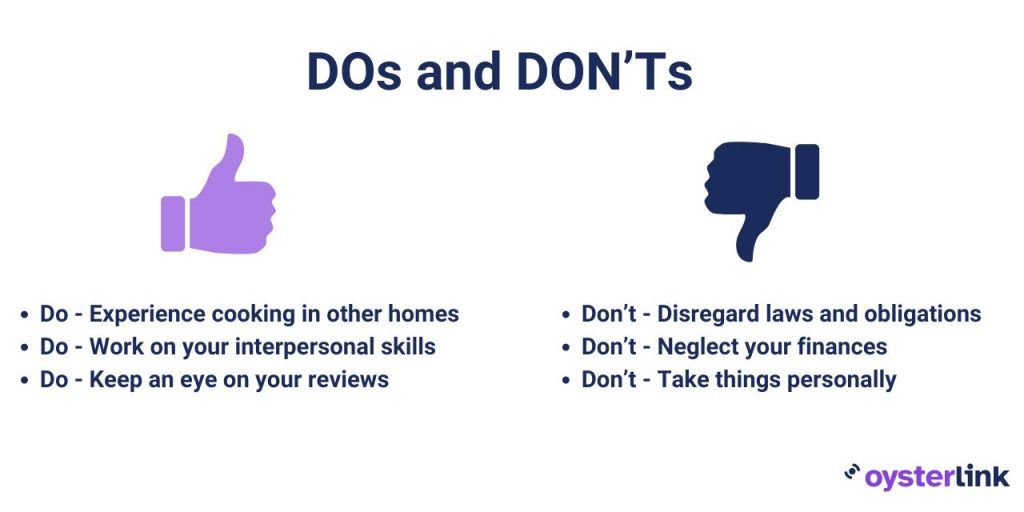How To Become a Private Chef in 2026: Complete Guide to Freelance and Agency Roles
Being a Private Chef, also known as a Personal Chef, gives you the opportunity to be flexible with your working hours, the freedom to choose the clients you want to work with and a good salary.
If you’ve been working in restaurants and want to explore the path of working as a Private Chef, this step-by-step guide is for you.
Steps To Become a Private Chef
The pathway to becoming a Private Chef involves having culinary expertise, knowing what you want out of the role and doing a lot of research.
Step 1: Have years of kitchen experience
Private Chef employers in the U.S. typically require a minimum of three years of experience in a fine dining restaurant. However, some may demand at least ten years of professional background.
Clients, particularly in high-end households, often have specific dietary requests and restrictions that require private chefs to have extensive culinary experience and adaptability.

In addition to being able to adapt to different dietary requests and restrictions, having years of kitchen experience enables you to be an effective problem solver.
Since you’ll work alone as a Private Chef, you need to know how to troubleshoot problems by yourself, such as addressing ingredient shortages, fixing equipment malfunctions and handling unexpected situations like last-minute changes to the menu.
This makes the work environment of a Private Chef unsuitable for entry-level roles like Line Cook, as you won’t have anyone to guide you through the complexities of the job.
Be open to working in people's homes
Finally, you must maintain professional behavior at all times. Working in people’s houses exposes you to a lot of intimate situations.
You might find yourself engaged in personal conversations or caught in the middle of family conflicts. Not being able to handle these situations professionally can strain relationships, ultimately leading to the loss of a client.
Only experienced Chefs, such as Sous Chefs, are equipped with emotional intelligence, mediation skills and the ability to stay neutral to manage these complex situations effectively.
Step 2: Decide if you want to be an employee or work for yourself
Do you want to be hired by an agency and let them take care of finding you clients but give them a cut of your salary? Or do you want to be your own boss, work hard to book clients and keep 100% of the profits?
The choice depends on your career goals.
- Be employed by others: You’ll have to deal with not having a say in the type of clients you’ll work with, the cuisine you’ll prepare and your work schedule.
- Be self-employed: This entails a higher level of responsibility. You have to create your own marketing strategies, handle administrative tasks and manage finances.
If you’re not comfortable deciding between the two right now, consider working part-time first. This can give you a sense of what it’s like to work as a Private Chef and help you decide whether you want to work under an agency or manage your own business.
Step 3: Do market research
This step is applicable whether you choose to be employed by someone else or register as being self-employed.
If you choose to work for an employer, researching your market means looking into the clients your agency caters to.
For example, if the agency you’re applying to focuses on providing meal services to older adults, you should be skilled in preparing a variety of soft-textured foods and accommodating dietary requirements, such as those for diabetes or heart disease.
If the agency serves corporate clients, then be ready to come up with meals that are visually appealing, nutritious and can be eaten on the go, such as wraps and sandwiches.
If you manage your own business or book your own clients, market research is more extensive. You have to know who your competitors are, their pricing structures and the services they offer.
You also need to determine where your potential clients live, where they spend most of their time and what kind of jobs and lifestyles they have. This information will help you position yourself effectively in the market.
Do’s and Don’ts of Becoming a Private Chef
Keep these pointers in mind to help make the start of your Private Chef career smoother, more efficient and successful.

DOs
- Get a feel for cooking in other people’s homes: See how you manage finding your way through different kitchens and talking to people while preparing their meals. This helps build your confidence and improves your communication and organizational skills.
- Work on your interpersonal skills: Remember that you’re not just there to cook. You’re in someone else’s home, which means you’ll often interact with others. Learn how to entertain and create a pleasant experience without getting too personal.
- Make sure you get public reviews: Feedback from family, friends and customers through social media, your website and listing service platforms can help build your credibility. Since you’re a stranger entering people’s homes, it’s important to put potential clients’ minds at ease and establish trust.
DON’Ts
- Disregard food safety laws and tax obligations: Always comply with food safety regulations and practices, such as proper handwashing, using the correct temperatures to kill bacteria when cooking food and proper storage. Also, look into tax requirements, especially if you run your own business, to avoid legal issues and financial penalties.
- Neglect your finances: You can’t rely on getting paid on time. There will be instances where you’ll have to shoulder grocery costs first, which can take a bite out of your budget. Even if you’re employed, you’ll likely be in charge of your own transportation, gas and mobile phone plans so keep your finances in check.
- Take things personally: This is a job, so don’t let criticisms affect your self-esteem. You’re working closely with a client who’s paying for your services, so focus on addressing their specific needs and meeting their expectations without letting emotions get in the way.
How To Find Clients if You’re a Freelance Private Chef
If you’re set on launching your own Private Chef brand, we’ve listed some ways to help get your brand out there, both free and paid.
Paid
Listing service
Paying to get your services listed on credible platforms such as Thumbtack and HireAChef can significantly boost your brand image and online visibility.
Presence on popular listing websites builds trust with potential clients and improves your SEO ranking. These platforms typically allow you to add your website to your profile, which can drive valuable traffic to your website if you have one.
In addition, many listing services have a client reviews section, which can serve as proof of your expertise, dependability and creativity, which will convince potential clients to book your services.
Advertisements
Hire a Paid Media Specialist to set up ads so you appear in search engine results and on social media platforms when someone types keywords like “Private Chef near me” or “Chef services.”
Use the information you gathered from your market research, such as age, location, income level, interests and hobbies, to target your ideal audience.
Free
Social media
If you have a knack for writing entertaining captions and taking great pictures, social media can be a valuable tool.
Engage actively with those who comment on your posts, as this interaction can encourage more people to check out your services.
Make sure to use relevant hashtags and keywords related to Private Chef services in your area so you appear to the right audience.
Network
Tell your friends and family about your plan to launch your own business. Offer them a trial of your services in exchange for reviews.
Once you’ve exhausted your immediate network, reach out to all your acquaintances. Consider implementing referral bonuses to incentivize your network to promote your services.
Website
Create and manage your own website using free platforms like Weebly, Wix or WordPress. These beginner-friendly website builders have a drag and drop option which is perfect for those with no coding experience.
You can double down by learning basic SEO so you can optimize your site for search engines at no cost.
